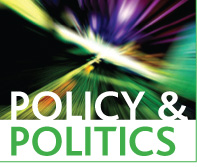Tom Entwistle
 This section of Discover Society is provided in collaboration with the journal, Policy and Politics. It is curated by Sarah Brown.
This section of Discover Society is provided in collaboration with the journal, Policy and Politics. It is curated by Sarah Brown.
Nudge is regularly in the news. Thaler and Sunstein coined the term to describe the way in which governments could use small policy interventions (like an advert, a sign, or a letter) to ‘nudge’ people into changing their behaviour for the better, both for themselves and for society at large. Experts in nudge (so called behavioural scientists) have been busy during the current pandemic advising the government on the best way of getting people to follow coronavirus health advice, whether it be washing your hands while singing happy birthday or staying at home to save the NHS.
From track and trace to social distancing, it is clear however that some people do not always do what they are told. In a recent article in Policy & Politics, I describe how scholars working in public health draw on the notion of fatalism to explain the intractability of citizens who ignore their doctor’s advice. A fatalist mindset inclines some people to believe that their fortunes are, in the strongest sense of the word, predetermined or at least heavily constrained by forces beyond their control. People who believe their lives are characterised by luck, powerlessness and impenetrable complexity tend to respond poorly to authoritative advice. Three types of fatalism are of particular relevance to nudge.
Passive fatalists lack either the capacity or appetite to access, understand and analyse the information needed for rational decisions. Some economists go further, pointing to an ‘ostrich effect’ in which people deliberately avoid information which challenges their preferences. With a limited appetite for rational decision making, passive fatalists ignore advice, preferring to carry on behaving as normal instead. While so called ‘default’ nudges use this passivity to auto-enrol into pension schemes and organ donation, these strategies run the risk of riding roughshod over the unvoiced preferences of passive fatalists. Should people be defaulted into pension planning or donating their organs in death, just because they lack the resources of time or energy to question the default?
Protective fatalists are similarly resigned to randomness and constraint, but they are rational in their attempts to guard against misfortune. Protective fatalists do not however just meekly follow official guidance. Based on a realistic assessment of their circumstances, protective fatalists develop a bespoke understanding of the threats confronting them and the protective measures that can be adopted. Protective fatalism can explain why some take the calculated risk of continuing to smoke, drink and eat red meat. It is not that protective fatalists are blind to health advice but rather that they think on balance that these are acceptable risks for them as individuals to take.
The agency unleashed by fatalism is not always so discerning or protective. Researchers point to a third form of fatalism – emerging from the alienating experience of coercive control – which might be described as pathological. Pathological fatalists react to the imposition of constraint by gaming or even subverting the system, and in extreme cases, committing acts of self-destructive rebellion. In such a way, the pathological form of fatalism might explain why some people wilfully ignore nudges that are perceived as manipulative; deliberately acting in exactly the opposite way indicated by the nudge.
Researchers identify a series of different explanations for the emergence of fatalism. Value explanations point to the beliefs, attitudes or cultures of specific individuals or communities. In such a way, fatalism is sometimes described as intrinsic to an individual’s personality or the culture of a particular region, country or religion. Others attribute fatalism to socio-economic factors – like age, education, poverty and so forth – which are associated with particular life experiences. The structural circumstances which condemn some people to poor health or poor prospects cultivate fatalism irrespective of individual psychology or community culture. Finally, some pin the fatalism ‘problem’ on institutional arrangements like the laws of a political system or the processes of an organisation. The bewildering complexity of these systems can sometimes leave us (whether as employees, clients or citizens) resigned to our incapacity to defend our interests.
Whatever the causes, fatalism poses a particular problem for nudge because the theory presumes that governments can use relatively subtle interventions to change behaviour. Nudges work by keying into our intuitive tendencies to act rationally, follow rules or do the right thing. Fatalism overwrites those biases with a predisposition to give up on rationality, ignore rules and sometimes to act hedonistically. Fatalists might then dismiss the risks of disease, refuse to follow the rules for healthy living and on occasion commit acts of self-destructive delinquency. The relatively subtle reminders to do the right thing provided by nudge may not be sufficient to change the fatalist mindset.
So, what can governments do? The fatalism literature suggests three different responses. The first might be viewed as a ‘horses for courses’ strategy that would develop bespoke interventions designed specifically for the different types of fatalism. Passive fatalists cannot be persuaded by rational argument, so there is no point giving them more information. Default nudges may be more successful but there is an onus on governments to ensure that defaults genuinely work in the interest of those subjected to them. While appropriately targeted information may influence protective fatalists, simple messages intended to deliver population-level outcomes are unlikely to work. Protective fatalists need information crafted to fit their situated analyses of risk. Nudges designed to make a game of randomness – so called gamification – may work in places where authoritative guidance causes a pathological response.
Rather than trying to work with the grain of a fatalist mindset, an alternative approach would seek to combat the causes of fatalism itself. Role models, education and counselling are all considered in the literature. Policies to amplify the voices of groups excluded from the decision-making processes may lessen the tendency for fatalist thinking. More challenging still, governments could try to relieve the structural problems associated with poverty, education, ethnicity and age that serve to marginalise and disempower some communities. To the extent that these problems can be ameliorated, it may prove possible to lessen the recourse to fatalism repeatedly diagnosed among the dispossessed. The problem with this agenda of course is that the more information we provide, the harder we push or the more actively we persuade, the less the intervention can justifiably be described as a nudge.
Both these approaches presume that fatalism is in some sense a problem that needs to be combatted, contained or managed in some way. Contemporary research increasingly recognises however, that fatalism can make sense. Some things, perhaps quite a lot of things – like the progress of a disease, the state of the economy or the decisions of a government – genuinely lie beyond our individual control. It is only by accepting these things (probably quite a lot of things) as immutable that we as individuals can work out what is achievable. Instrumental action requires bounds of some form: non-negotiable regularities that provide a framework for choice.
Depending upon their structural positions and life experiences, different people will inevitably see those bounds in different places. When fatalism is rational and when the circumstances that foster it cannot reasonably be addressed – and given the prevalence of fatalism among the poor and marginalised, this judgement should not be arrived at lightly – there is a case for respecting fatalist thinking and deciding not to nudge. Nudge may be in the news, but it is not the only tool in the policy cupboard.
Tom Entwistle is professor of public policy and management at Cardiff Business School.
